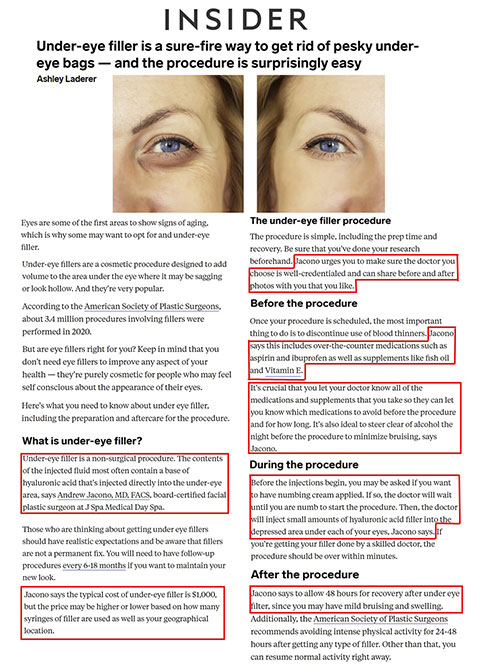New York Center for Facial Plastic Surgery
Schedule a consultation
Schedule today

The eyes are the most vulnerable parts of the face and are particularly susceptible to aging. While younger people have taut, smooth under-eye skin, older people suffer from hollower, more wrinkled orbital anatomy. This can make them look exhausted, morose, and irritated.
To delay the aging process, millions apply nightly creams, moisturizers, and exfoliators. More often than not, however, these products offer limited returns. Worse, they can be a hassle to apply.
Fortunately, there are countless new and innovative ways to restore diminishing under-eye volume. One of these is through the use of injectables.

“Under-eye fillers are non-surgical cosmetic injections that use hyaluronic acid to fill in hollow facial spaces,” says Dr. Jacono. “These fillers are effective tools in the fight against aging. They are quite simple to use and last a long time: anywhere between 6 and 18 months.”
Because of their excellent results and ease of use, under-eye fillers have become incredibly popular, and not just among aging populations. In fact, according to the American Society of Plastic Surgeons, around 3.4 million filler procedures were performed in 2020 alone. “What always surprises me is how many prospective patients come to my office with previous knowledge about fillers,” continues Dr. Jacono. “A lot of this is because of social media. So many people post about their experiences with injectables on Instagram, Facebook, and even Twitter. In a way, it seems as though we’re living through an aesthetic golden age.”
Before you go ahead and schedule an appointment, make sure to do your research! You should visit a board-certified dermatologist or plastic surgeon who has proven experience with injectables and offers the fillers in which you are most interested. This can be Juvéderm, Belotero, Restylane, or something else.
Once you’ve chosen your doctor and scheduled an appointment, it’s important to discontinue the use of blood thinners. This includes over-the-counter medications like aspirin and ibuprofen. You should also stop using supplements like fish oil and Vitamin E.
“Try your best to avoid alcohol the night before the procedure to minimize bruising and have a speedier, more effective recovery,” Dr. Jacono advises.
When it’s time for the procedure, your doctor may ask if you would like to use numbing cream. Then, they will inject small amounts of hyaluronic acid filler into the depressed areas under each eye. “Even though the under-eye area is very sensitive, a skilled doctor knows how to minimize pain and complete treatment within a few minutes,” adds Dr. Jacono.
“The ultimate goal is for the procedure to be as little of an inconvenience to the patient as possible.”
After injection, it’s best to give yourself at least 48 hours to recover. You may experience mild bruising and swelling. In addition, the American Society of Plastic Surgeons recommends avoiding intense physical activity for up to 2 days. Otherwise, you can resume normal activity right away.
If you are interested in fuller, smoother-looking eye skin, you don’t necessarily need surgery. In fact, you could avoid a more invasive surgical procedure for several years.
“If you’re young and want to add more volume to the area under your eyes, you can opt for a hyaluronic acid injection,” says Dr. Jacono. “It’s quick, relatively painless, and can help you look refreshed.”
Dr. Jacono also uses fillers on older patients, though for this population, he recommends surgery.
“Unfortunately, as time goes on and the skin loses its natural elasticity, injections become less and less effective. Eventually, they are unable to address more glaring problems than something like a blepharoplasty—otherwise known as an eyelid lift—could reverse.”
In the end, as with everything, it’s all a question of preference and convenience!

Accessibility: If you are vision-impaired or have some other impairment covered by the Americans with Disabilities Act or a similar law, and you wish to discuss potential accommodations related to using this website, please contact our Accessibility Manager at (212) 570-2500 .